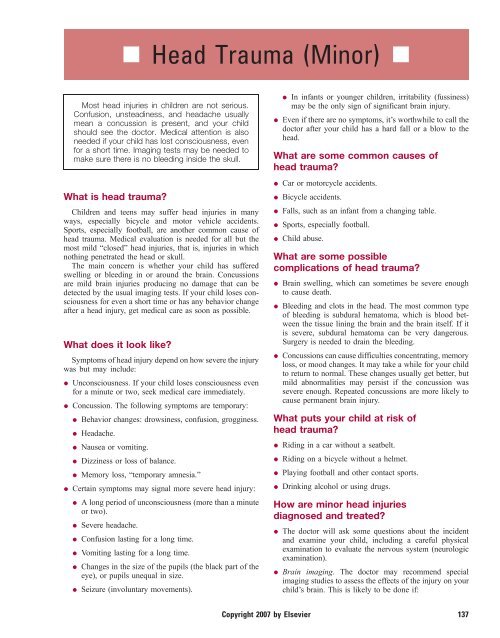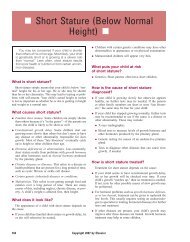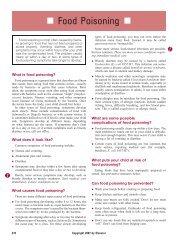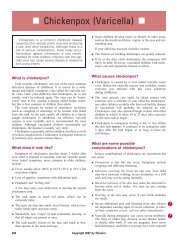Head Trauma (Minor) - Impcna.com
Head Trauma (Minor) - Impcna.com
Head Trauma (Minor) - Impcna.com
Create successful ePaper yourself
Turn your PDF publications into a flip-book with our unique Google optimized e-Paper software.
n <strong>Head</strong> <strong>Trauma</strong> (<strong>Minor</strong>) n<br />
Most head injuries in children are not serious.<br />
Confusion, unsteadiness, and headache usually<br />
mean a concussion is present, and your child<br />
should see the doctor. Medical attention is also<br />
needed if your child has lost consciousness, even<br />
for a short time. Imaging tests may be needed to<br />
make sure there is no bleeding inside the skull.<br />
What is head trauma<br />
Children and teens may suffer head injuries in many<br />
ways, especially bicycle and motor vehicle accidents.<br />
Sports, especially football, are another <strong>com</strong>mon cause of<br />
head trauma. Medical evaluation is needed for all but the<br />
most mild “closed” head injuries, that is, injuries in which<br />
nothing penetrated the head or skull.<br />
The main concern is whether your child has suffered<br />
swelling or bleeding in or around the brain. Concussions<br />
are mild brain injuries producing no damage that can be<br />
detected by the usual imaging tests. If your child loses consciousness<br />
for even a short time or has any behavior change<br />
after a head injury, get medical care as soon as possible.<br />
What does it look like<br />
Symptoms of head injury depend on how severe the injury<br />
was but may include:<br />
Unconsciousness. If your child loses consciousness even<br />
for a minute or two, seek medical care immediately.<br />
Concussion. The following symptoms are temporary:<br />
Behavior changes: drowsiness, confusion, grogginess.<br />
<strong>Head</strong>ache.<br />
Nausea or vomiting.<br />
Dizziness or loss of balance.<br />
Memory loss, “temporary amnesia.”<br />
Certain symptoms may signal more severe head injury:<br />
A long period of unconsciousness (more than a minute<br />
or two).<br />
Severe headache.<br />
Confusion lasting for a long time.<br />
Vomiting lasting for a long time.<br />
Changes in the size of the pupils (the black part of the<br />
eye), or pupils unequal in size.<br />
Seizure (involuntary movements).<br />
In infants or younger children, irritability (fussiness)<br />
may be the only sign of significant brain injury.<br />
Even if there are no symptoms, it’s worthwhile to call the<br />
doctor after your child has a hard fall or a blow to the<br />
head.<br />
What are some <strong>com</strong>mon causes of<br />
head trauma<br />
Car or motorcycle accidents.<br />
Bicycle accidents.<br />
Falls, such as an infant from a changing table.<br />
Sports, especially football.<br />
Child abuse.<br />
What are some possible<br />
<strong>com</strong>plications of head trauma<br />
Brain swelling, which can sometimes be severe enough<br />
to cause death.<br />
Bleeding and clots in the head. The most <strong>com</strong>mon type<br />
of bleeding is subdural hematoma, which is blood between<br />
the tissue lining the brain and the brain itself. If it<br />
is severe, subdural hematoma can be very dangerous.<br />
Surgery is needed to drain the bleeding.<br />
Concussions can cause difficulties concentrating, memory<br />
loss, or mood changes. It may take a while for your child<br />
to return to normal. These changes usually get better, but<br />
mild abnormalities may persist if the concussion was<br />
severe enough. Repeated concussions are more likely to<br />
cause permanent brain injury.<br />
What puts your child at risk of<br />
head trauma<br />
Riding in a car without a seatbelt.<br />
Riding on a bicycle without a helmet.<br />
Playing football and other contact sports.<br />
Drinking alcohol or using drugs.<br />
How are minor head injuries<br />
diagnosed and treated<br />
The doctor will ask some questions about the incident<br />
and examine your child, including a careful physical<br />
examination to evaluate the nervous system (neurologic<br />
examination).<br />
Brain imaging. The doctor may re<strong>com</strong>mend special<br />
imaging studies to assess the effects of the injury on your<br />
child’s brain. This is likely to be done if:<br />
Copyright 2007 by Elsevier 137
138 n <strong>Head</strong> <strong>Trauma</strong> (<strong>Minor</strong>)<br />
Your child is not acting normally (is confused, groggy,<br />
nauseous, etc.) for more than just a short time.<br />
The physical examination was abnormal.<br />
Your child has persistent vomiting or severe headache.<br />
The usual test is an x-ray procedure called <strong>com</strong>puted<br />
tomography, or CT scan. The scan will show whether<br />
there is any bleeding or blood clot that may pose a<br />
danger to the brain.<br />
Skull x-rays. X-rays of the skull may be performed if the<br />
doctor thinks there may be a skull fracture.<br />
Observation in the hospital. If treatable problems are found<br />
but the doctors are concerned about the injury or the way<br />
your child is acting, he or she will be hospitalized overnight<br />
for careful observation to see if further treatment is needed.<br />
Home monitoring. In some cases, the child may be sent<br />
home for monitoring. You will be asked to watch him<br />
or her closely for the first 24 hours.<br />
Follow-up. Children with significant head trauma may<br />
need special developmental tests to detect small effects<br />
on the brain. These tests are often performed by a specialist<br />
called a neuropsychologist.<br />
Serious or severe head trauma resulting in bleeding or<br />
swelling of the brain requires treatment by a neurosurgeon<br />
(a surgeon who specializes in problems involving<br />
the brain) in an intensive care unit (ICU).<br />
When should I call your office<br />
While monitoring your child at home after being seen<br />
and evaluated, call our office if any of the following occurs:<br />
For any head injury that causes unconsciousness, grogginess<br />
or confusion, vomiting, or severe headache.<br />
Any time your child has a hard injury to the head, even<br />
if there are no symptoms.<br />
Worsening or severe headache.<br />
Weakness, dizziness.<br />
Vomiting.<br />
Difficulty waking.<br />
Different-sized pupils, or pupils that don’t change much<br />
in response to light.<br />
Seizures (involuntary body movements).<br />
Confusion or irritability; won’t stop crying.<br />
Copyright 2007 by Elsevier













